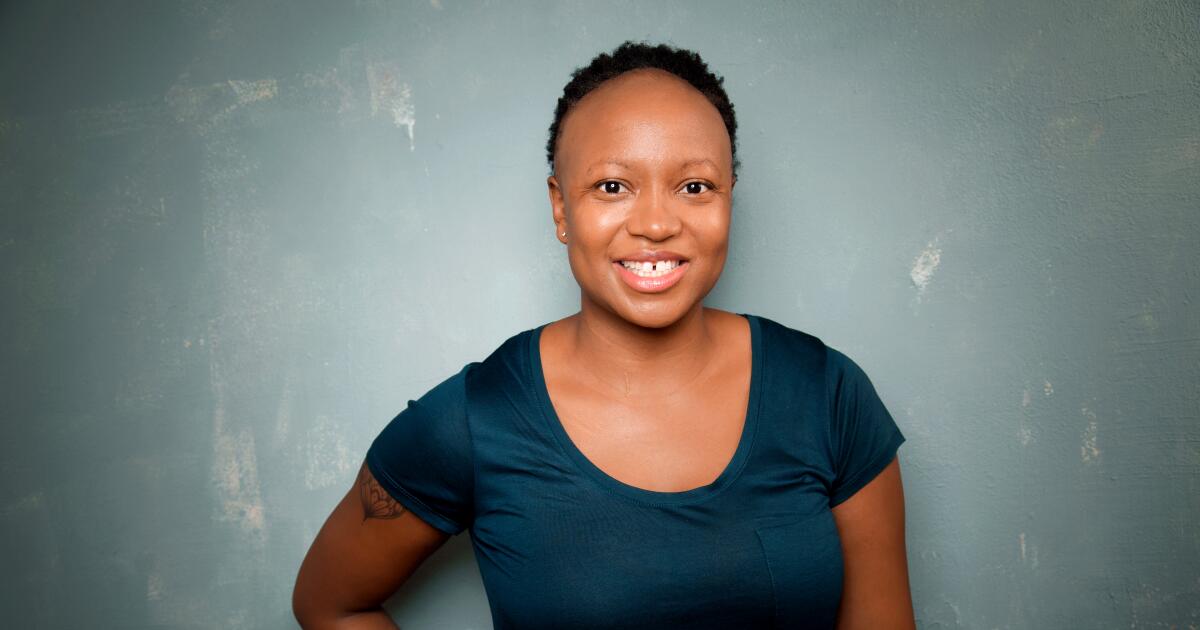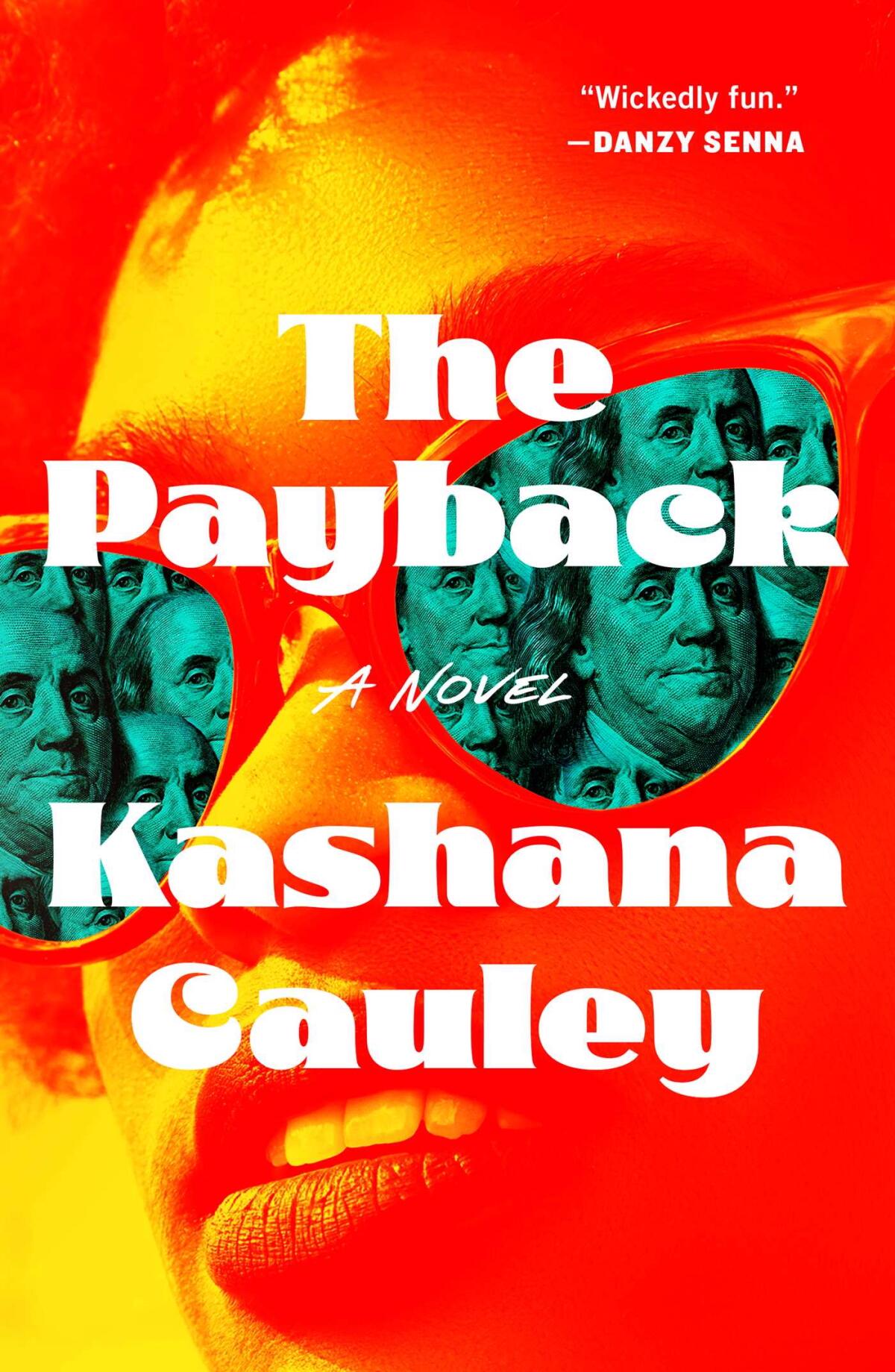‘The Payback’ review: Kashana Cauley satirizes student loan debt

Book Review
The Payback
By Kashana Cauley
Atria: 256 pages, $28
If you buy books linked on our site, The Times may earn a commission from Bookshop.org, whose fees support independent bookstores
There are a frightening number of ways an American can become indebted today: there’s medical debt (I won’t be paying off my child’s birth until he’s nearly 5 years old, and I have insurance). Mortgages, of course (though as a millennial living in an expensive city, I wouldn’t know what those look like). And then there’s student loan debt carried by nearly 43 million Americans, and which disproportionately affects Black women. But hey, at least one good thing has come of that, as TV writer and novelist Kashana Cauley graciously acknowledges in her new book, “The Payback”: “To the student loan industry,” reads her dedication, “whose threatening phone calls made this book possible.”
Narrated by Jada Williams, a wardrobe designer turned retail salesperson, “The Payback” is full of such you-gotta-laugh-to-keep-from-crying humor. The book opens at Phoenix, the clothing store at the Glendale mall where Jada now works, and includes a hilarious yet mostly sincere appreciation for the beleaguered centers of suburban America: “I loved mall smell,” Jada narrates, waxing poetic about the scents of the bins at the candy store and the ever-present pizza smell before admitting that she sometimes even leans down to smell the plastic kiddie ride horses. “Sometimes, when there were no kids, I’d lean into the horse and sniff it to get a whiff of plastic, childhood dreams, and dried piss. Yes, I know, nobody’s supposed to savor the aroma of pee, and I wouldn’t rank it first among the smells of the world, but pee is life. It’s humanity. It’s the mall.”
Jada loves the mall, and she even loves her job, which is not a given for anyone who’s lost their dream career like she did. She’s passionate about helping people find the clothes that look and make them feel good, even if she’s doing that for 20% commission. She’s definitely gotten over her sticky fingers habit, too, except that, well, on the day the book opens, someone leaves an expensive watch in the fitting room, and Jada can’t help but pocket it. This eventually leads to her getting fired, but not before the boss she likes, Richard, dies on the store’s floor and Jada and her co-workers get to witness the newly formed debt police in action chasing and beating up Richard’s grieving widower during his wake.

The debt police are exactly what they sound like: cops who come after people in debt. Cauley, a former writer for “The Daily Show With Trevor Noah” who has contributed to the New Yorker, has fun with this concept: she dresses them up in turquoise and makes them all obnoxiously hot and as annoying as the worst Angeleno cliché you can think of (they’re especially obsessed with overpriced new age treatments and diet culture). The cherry on top is their true apathetic evil. “These Leo moon incidents are always the worst,” a debt policeman says, for example, while literally beating Jada up.
Six months after she’s fired, Jada is making money by “eating food on camera in the hope that internet people, mostly guys, according to their screen names and Cash App handles, would pay [her] rent.” She eats shrimp for its pop and the way she can lick it; graham crackers for their whisper and crackle; almonds for their snap; celery sticks for their crunch. On the one hand, she’s paying her rent; on the other hand, her relationship to food has become sonically focused and exhausting.
The saving grace is that Jada manages to stay friends with her former Phoenix co-workers, Lanae (frontwoman of a punk band, the Donner Party) and Audrey (a runner and hacker in her spare time). Together, they come up with a plan to erase their own — and everyone else’s — student loan debt. It’s a heist, of sorts, except instead of getting rich, they’ll stop being in the hole for tens or hundreds of thousands of dollars. But the real pleasure, just like it is in any good heist movie, is witnessing the three women spending time together and becoming closer over the course of the book.
Jada is a deeply imperfect narrator. She’s quick to judge others, slow to trust, and even steals a watch on page 12 (Gasp! She’s a thief!) So, yes, she’s a messy millennial who has some issues to work through, but neither she nor anyone deserves to spend the rest of their life indebted to a system that claimed a college education as the only way to break into the middle class, and which instead ends up keeping so many from it.
The novel is a satire, of course, and the debt police are over the top because it’s generically appropriate, but also because Cauley is using humor to approach the horrifying reality that people really do go to prison for having debt in this country. And even when they don’t, student loan debt ends up increasing the racial wealth gap. According to the latest data from the Education Data Initiative, “Black and African American college graduates owe an average of $25,000 more in student loan debt than white college graduates.” Flash-forward four years after graduation, and “Black students owe an average of 188% more than white students.”
Yet the job of a novelist isn’t to hit you over the head with statistics but to entertain you — if you learn anything along the way or think more deeply about something you’d never considered, that’s great, but it’s not the main point. For all that it deals with systemic racism and economic precarity, “The Payback” is a terrifically fun book that made me laugh out loud at least once every chapter.
Masad, a books and culture critic, is the author of the novel “All My Mother’s Lovers” and the forthcoming novel “Beings.”





